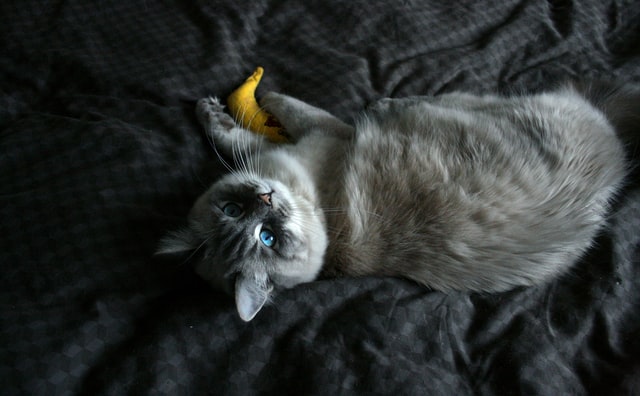While bananas make a delicious and nutritious snack for humans, do they also make a nutritious treat for our feline friends? The short answer is cats can eat bananas, but should they eat one? Sure, they can munch and gnaw on this soft substance, but is it recommended that they eat this fruit every day?
Read on to know more about how bananas can affect a cat’s body, the risks and benefits, when and how often they should be given bananas, and more.

Can cats eat bananas?
Cats can safely eat bananas. This fruit is not toxic for them. However, bananas should not be part of your cat’s regular diet. This is because bananas have high sugar content, and if consumed excessively, this could lead to the development of health issues, such as obesity and diabetes. Therefore, while cats can eat bananas, they should not be given every day.
Do cats like bananas?
Bananas make a sweet and pleasant fruit for humans. Cats, on the other hand, are not capable of tasting sweetness. As a result, they would be unable to savor this fruit’s sweet flavor. Having said that, the chances of cats enjoying bananas differ from one cat to another. This delectable food, particularly the frozen varieties, might appeal to some felines. Others, on the other hand, would not dare to lick it.
Are bananas safe for cats to eat?
Most cats usually would not have any problem eating bananas. However, some cats may develop an allergic reaction after eating even a tiny slice of banana. If your cat is starting to show symptoms, make sure to consult his veterinarian immediately. Then, keep a watchful eye on your cat for any signs of an allergic response.
Are bananas good for cats?
Bananas contain several nutrients and minerals essential for a human’s body, including fiber, potassium, magnesium, folic acid, and vitamin C. These can also benefit cats. Some foods are specially designed to meet all the nutritional needs of cats. In addition, the high level of sugar present in bananas can lead to health issues if given excessively.
Therefore, there is no need to give fruits, vegetables, or grains as a part of your cat’s regular diet because their kibbles and canned food can meet all the nutrients their body needs. Bananas would be fine if treated as an occasional treat, such as when you want to reward your feline friend for his good behavior or when you are hiding a pill from them.
What are the risks of feeding bananas to cats?
Although a little amount of banana every once in a while won’t hurt your cat, feeding them frequently may lead to health problems, as mentioned earlier. You should keep in mind that cats are carnivores, meaning they would mostly eat meat daily.
Some cats are sensitive to certain foods, including bananas. Vomiting, bloating, diarrhea, and constipation are only some of the signs that the cat’s body is not handling the banana properly. On the other hand, cats that are allergic to bananas may display watery eyes and nose, itchy mouth, wheezing, itchy rash, and inflammation of the mucous membrane around their mouth, gums, tongue, and nose.

In addition, cats already diagnosed with obesity and diabetes should not take sugary foods, such as bananas. Signs of diabetes in cats include weight loss, inability to hop or jump, loss of appetite, increased urination, excessive thirst, and digestive issues.
If you notice that your cat is showing any symptoms mentioned above, make sure to have them checked by the veterinarian immediately.
How do I feed bananas to cats?
Of course, there is a proper way of feeding bananas to your cats. First, remove the peel. Your cat should not eat banana peel because it can be difficult for them to digest it, and it can also be a choking hazard. In addition, banana peels contain ethyl acetate, which cats do not like. This is why you see videos of cats online being scared of bananas.
After peeling the banana, make sure to cut it into small pieces – something that should be easy for your feline friend to chew. You can also much or turn it into puree before topping on your cat’s kibble. Lastly, monitor your cat for adverse effects. Again, seek your veterinarian’s help if your cat shows signs of allergic reaction or gastrointestinal problems.
Also, keep in mind the 90/10 rule of the daily caloric intake of cats. This means that 90% of the calories that your cat ingests every day should be acquired from their regular food diet. The remaining 10% should contain healthy snacks.
Can kittens eat bananas?
A healthy adult cat can eat bananas occasionally, but what about kittens? It is recommended for kittens to eat foods specially designed to meet the nutrients their body needs. However, as they grow older, you can slowly introduce them to bananas.
More to read:
– Can I feed my cats dog food?– List of fruits for your cat’s diet
Final thought
The key takeaway from this article is that cats can eat a banana so long as it is given in moderation, occasionally, and in the proper way. If your cat appears to enjoy bananas and begs you to feed them to him regularly, resist the urge to give in to his pleading for the sake of his health. Keep in mind that too much of anything is harmful to your cat’s health. Furthermore, giving your cat bananas on a frequent basis may put their health at risk and cause them to ignore their regular food, which can be an issue.
In the end, there’s nothing bad about giving your cat special treats once in a while. Just watch them closely for any signs of an allergic reaction, and only give it when needed. Commercially available snacks are also available that your cat will undoubtedly enjoy, so you might want to give them a try instead of feeding them items that are not meant for their health.
